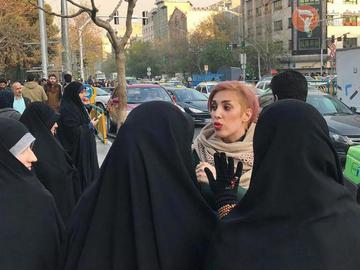In a strange turn of events during renewed nuclear talks this week, Ali Bagheri Kani, the Islamic Republic’s deputy foreign minister in charge of negotiations, flew from Vienna to Iran and back again after spending just a few hours on home soil.
A tense, eighth round of talks aimed at salvaging the JCPOA began shortly after New Year. The stakes are now so high that Iranian officials require permission from the Supreme National Security Council to advance any aspect of the discussion. Bagheri Kani returned to Tehran last week and was present in the country on Saturday, the day the Council was set to convene.
Two weeks in, the Vienna talks have reportedly now reached a critical stage. In private statements, involved parties have suggested now is the time for face-to-face contact between representatives of the Islamic Republic and the United States. Bagheri Kani's visit to Tehran is widely believed to have been aimed at securing permission for direct talks with the Americans.
Could Khamenei Authorize Direct Talks With the US?
Before the JCPOA was signed, officials of the Islamic Republic had negotiated directly with high-ranking representatives of the US government – both openly and in secret. Recently, however, Ali Khamenei withdrew his permission for them to do so again and explicitly barred Iranian officials from contact with their American counterparts. This awkward situation has been to the benefit of Russian lead negotiator Mikhail Ulyanov, who has stepped into the resulting void as self-appointed arbiter of dialogue between Iran and the US.
Ali Bagheri Kani's personal, warm relations with the Office of the Supreme Leader, as well as family ties to Ali Khamenei, mean he stands a better chance than most of convincing Khamenei to reverse the ban on. Alternatively, if the Islamic Republic wants to publicly preserve its ‘anti-US’ position, there is a chance he will be granted – or has already been granted – permission to take part in secret meetings with US officials instead.
JCPOA-watchers will therefore want to pay attention to any change in Moscow or Ulyanov’s level of prominence in the talks in the coming days. If Ulyanov appears to take a step back from the relentless public announcements, or a breaking of the current, reported deadlock is announced, it could be a sign that contact between Iran and the US took place.
Rob Malley, the US’s current Special Envoy for Iran and former lead negotiator in the run-up to the 2015 agreement, has repeatedly called indirect dialogue a waste of time. On the Iranian side, Hossein Mousavian, a former negotiator who now serves as the Islamic Republic's unofficial representative to the United States, has also acknowledged: "The United States does not agree to concessions in indirect negotiations."
Most importantly, there are signs that Ali Khamenei may be poised to soften his position too. In a recent statement, the Supreme Leader said: "Negotiating with the enemy does not mean surrendering.”
Who Calls the Shots, the Supreme National Security Council or Khamenei?
Before the original nuclear deal was struck under the Hassan Rouhani administration, news surfaced at one point that then-Foreign Minister Mohammad Javad Zarif was leaving mid-talks for Tehran. Zarif then publicly stated that he had cancelled his trip – but also that if the stalemate continued, the main obstacle would have been Ayatollah Khamenei.
In his recently-published memoir, The Sealed Secret, Zarif goes on to explain that he was making secret trips back to Tehran to obtain various permissions from the Supreme National Security Council.
The Council is the main, officially-designated body ruling on matters related to the JCPOA, but in practice Khamenei is the final decision-maker. In the 22 months leading up to the signing of the JCPOA, the Supreme National Security Council convened 20 sessions in the presence of Ayatollah Khamenei. All of its resolutions of must be approved by him, or else they carry no executive weight. Khamenei was therefore invited to sit in on the Council meetings to speed up that decision-making process.
It was ultimately on Khamenei’s orders that Iran accepted the terms of the JCPOA. But he also imposed certain conditions on its implementation, largely concealed for the public. Not being an “official” part of proceedings also gave Khamenei the room to publicly criticize the deal as much as he liked immediately after it came into force.
Bagheri Kani: A Different Approach
Unlike before, the Vienna talks are now proceeding with nominal leaks of information from the Islamic Republic. Unlike Javad Zarif, Ali Bagheri Kani avoids speaking to the media about how the talks are progressing.
The brother-in-law of Hoda Khamenei, the Supreme Leader’s daughter, he is also said to be consulting directly with Khamenei on matters related to the JCPOA while his superior, Foreign Minister Hossein Amir-Abdollahian, plays only a marginal role.
Bagheri Kani has also had at least one direct conversation with US Deputy Secretary of State Nicholas Burns, during the pre-2015 period when Saeed Jalili was deputy secretary of the Supreme National Security Council. Given the current stalemate and his relatively trusted position, it therefore seems likely he will be granted permission to talk to his US counterparts directly. Whether the citizens of both countries will be informed of that is a different matter.
Related coverage:
Nuclear Talks: Why Saeed Jalili's Successors are Failing to Strike a Deal
Khamenei’s Self-Fulfilling Prophecies are Destroying Iran
Zarif's Farewell Letter to Parliament Reveals Obstacles Blocking a JCPOA Return
Nuclear Acceleration and Rocket Attacks: The Uncertain Future of the JCPOA
Why did Hassan Rouhani Blame Sanctions on 'Disrespect' for the Iranian Constitution?
Nuclear Chief Fears Iran Will be the Next North Korea
The IAEA Nuclear Impasse: Five Questions Tehran Needs to Answer
visit the accountability section
In this section of Iran Wire, you can contact the officials and launch your campaign for various problems


























comments